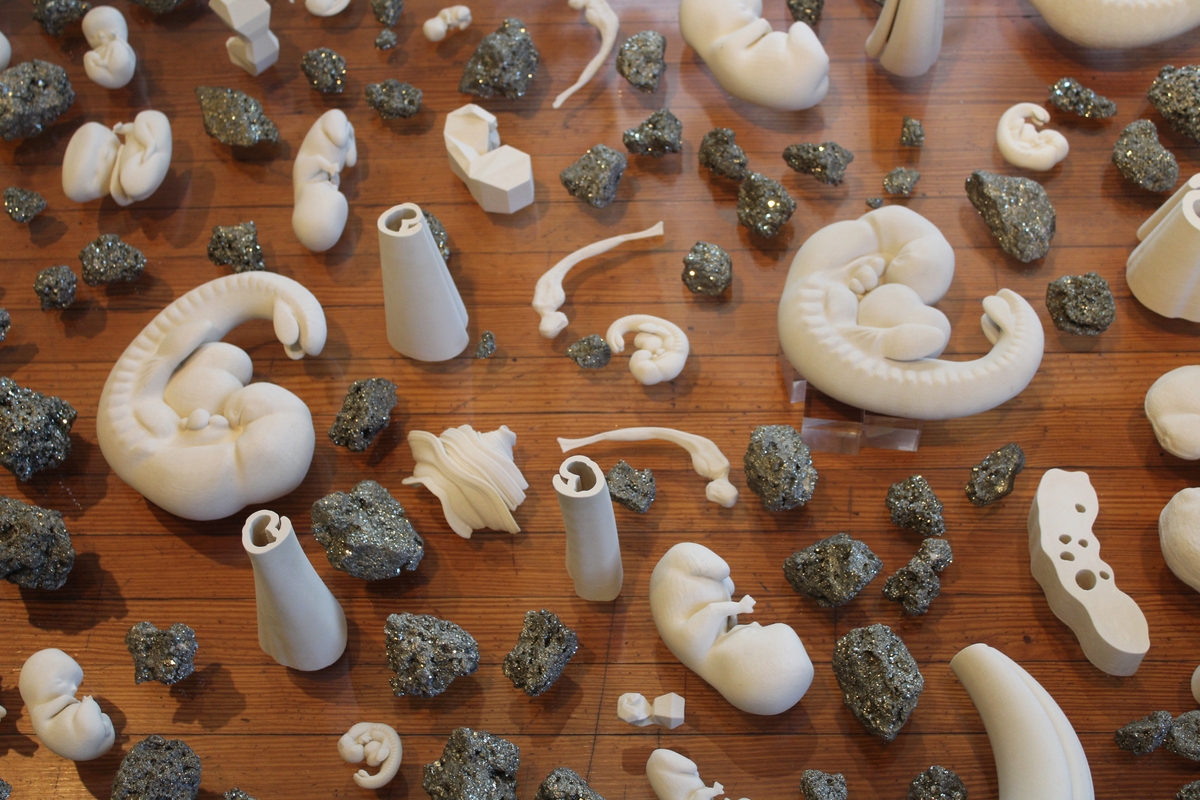
Origins and Future, detail.
Origins and Future spreads out across the floor of an upper gallery at the Ely Center of Contemporary Art on Trumbull Street. It’s composed of shapes that are fascinating and uncomfortable in equal measure. Are they the result of biology or technology? The stranger ends of the plant and animal kingdoms or something that was created in a lab? Or perhaps are they a mixture of both? Or, is it that the line between the natural and technological world is a lot more porous than we usually think it is?
The piece is part of “After Eden,” a show of the work of Suzanne Anker, an internationally acclaimed artist whose work has been brought to New Haven through a collaboration between the International Festival of Arts and Ideas and ECOCA. “After Eden” runs at ECOCA through July 17, but Anker is on hand this evening to give a talk at Yale Repertory Theatre, followed by a reception at ECOCA where audiences will be able to view the work.
“After Eden,” as an accompanying note describes it, “is composed of a series of collages, prints, sculptures and a video, all of which relate to altering nature. In this time of climate change and synthetic biology, living matter has undergone substantial change. The collages record the botanical specimens I have grown in my garden, interrupted by the “cut and paste” technique used in modern art to create new forms. In science, such a technique creates new living entities, by adding or subtracting gene sequences.” The show is a continuation of themes central to Anker’s art, “working at the intersection of art and the biological sciences.… Concerned with genetics, climate change, species extinction and toxic degradation, she calls attention to the beauty of life.” Her materials often include “botanical specimens, medical museum artifacts, laboratory apparatus, microscopic images and geological specimens. She works in a variety of mediums ranging from digital sculpture and installation to large-scale photography to plants grown by LED lights.”

Some of the pieces in “After Eden” veer toward the harder end of the sciences — as in a series of pieces that are essentially maps of chromosomes — in pieces that feel more conceptual than emotional. But they also provide the ground for a series of vivid pieces that, like Origins and Future, explore the uncanny areas where natural processes and technological movements mesh and clash. In some of her images, we see a natural environment transformed, edited, rearranged. It’s a scene of stunning beauty that’s also going through rapid, unpredictable change, with equal parts promise and menace.

Other pieces approach the same dynamic from the other side, as Anker uses lab equipment to frame her subjects. Here, however, rather than manmade processes altering nature, it’s natural processes bursting from the confines that manmade investigations and experiments place on them, with the same sense of an old order dissolving, and something as yet unformed taking its place.
Anker’s work is thus fertile ground as the artistic expression of the latest phase of thinking about climate change — the one that leaves utterly behind the idea that we can prevent it, and accepts instead that it’s far too late to turn back the clock. To those still thinking about climate change as we did, say, 40 years ago, when there was perhaps something we could have done, the new attitude toward it can feel like defeat, like surrendering to apocalypse. But that’s only if it’s viewed through the old lens. The newer way, as exemplified by writers like Emma Maris and Suzanne Simard, is about accepting change, about adapting, about plunging into the future, even if certain aspects of that future frighten us. It is also about complicating the previous narrative’s ideas about man versus nature, and suggesting more like what appears in Anker’s work, of nature and technology both in the throes of change, and the lines between them becoming perhaps a bit unstable.
Anker’s work acknowledges the fear many have about the future when they think about climate change — fear of leaving what’s comfortable, fear of new and unsettling things — but is also deeply imaginative in offering a possibility for what artifacts of that future might look like. Making it all just a little more tangible can help in coming to terms with it. Maybe it can also spur others to imagine the future they want for themselves in a swiftly changing world.
“The Age of Humans,” an artist talk with Suzanne Anker, is held tonight at 5:30 p.m. at Yale Repertory Theatre, 1120 Chapel St., in partnership with the International Festival of Arts & Ideas. An opening reception follows at ECOCA, 51 Trumbull St., from 7 p.m. to 9 p.m. “After Eden” runs at ECOCA through July 17. Visit A&I’s website and ECOCA’s website for more information.

Soooo interesting AND timely!!!
Thank you Suzanne for making us get off our cell phones and contemplate a broader vision.